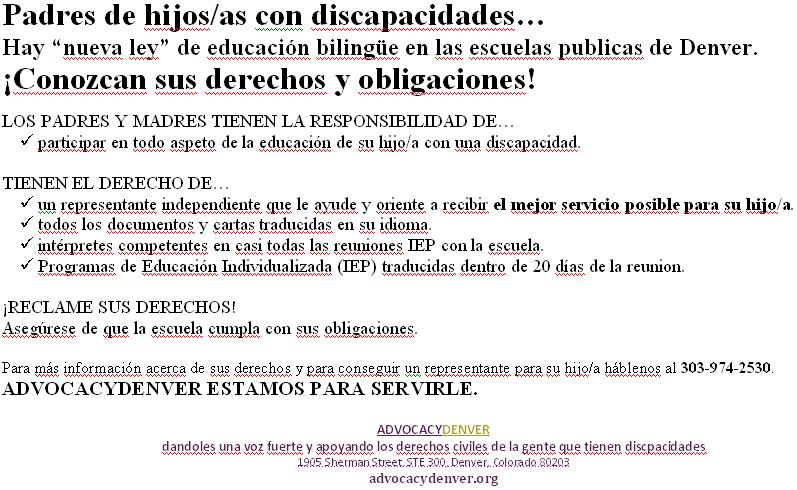AdvocacyDenver is now accepting resumes for our Advocate for Transition Services, Juvenile Justice, and Policy Development position
Job Description
- Work with the courts, education system, and providers to develop positive plans for individuals with disabilities residing in Denver who are involved with those systems.
- Provide individual advocacy for children and young adults with disabilities in Denver between the ages of 15 and 22.
- Take the lead on initiating and participating to improve services for these individuals and maximize their civil rights.
- Analyze and advise the Board of Directors and Staff on Legislative initiatives or rule changes in regard to these issues.
- Other duties as assigned by the Executive Director.
Position requirements
- Must have the ability to work flexibly with various individual circumstances and have the judgment necessary to establish appropriate limits, as necessary.
- Knowledge of the juvenile justice, education, Developmental Disability, and Mental Health systems.
- Demonstrated conflict resolution skills.
- Relevant degree, certification, or 5 years of experience; parent and client training experience is a plus.
- Being bilingual is not required, but will be taken into consideration
Compensation
Salary range to start at $32-34k annually. Benefits include health, dental, vision, paid time off, paid holidays, 401k, and more available.
To apply:
Please send your resume to advocacy@advocacydenver.org before 12/31/13. Interviews will be held in January.
New bilingual education laws in DPS
Sensory-Friendly Family Film Screenings!
From the AMC website:
“The program provides a special opportunity for families to enjoy their favorite films in a safe and accepting environment. The auditoriums dedicated to the program have their lights up, the sound turned down and audience members are invited to get up and dance, walk, shout or sing!”
Upcoming Screenings
Locations
Achieve With Us Film Festival

AdvocacyDenver says goodbye to past board member, dear friend
The staff of AdvocacyDenver sends its deepest condolences to the family and friends of the late Mrs. Frances Verhulst, who, along with her husband Joe, was a long-time member, past board member, and ally of the organization. Both Frances and Joe previously received the Shenkein award, an honor presented annually to a person or organization who has made a significant contribution to AdvocacyDenver.
In the words of executive director Aileen McGinley, “She will be sorely missed.”
Follow this link for information regarding services for Mrs. Verhulst.
2013 Colorado Legislative Committee Schedule
Follow the link below for a PDF of the 2013 House Committee schedule:
Follow the link below for a PDF of the 2013 Senate Committee schedule:
Kyle Frohne, long-time friend and self-advocate
AdvocacyDenver mourns the loss of friend and ally Kyle Frohne. Our deepest condolences go to his family and all those grieving the loss of an inspirational life.
“Kyle Alan Frohne, 41, died peacefully in his home on Sunday, November 4th 2012. Kyle will be lovingly remembered by his mother, Gerrie Frohne; his father and stepmother, Jim and Sharon Frohne; his sister Erica (Frohne) Conner, her husband John Conner and their son Grant; and his brother Alex Frohne, his wife Jackie Frohne and their children Molly and Wesley.
Kyle was born in Evanston, Illinois on May 15th, 1971. In 1978 Kyle and his family moved to Lakewood Colorado. Kyle’s childhood was rich growing up with his sister Erica and his brother Alex. He graduated from Golden High School in 1992 and attended Red Rocks Community College. Kyle went on to enjoy working at the Golden Public Library, sponsored by The Golden Optimist Club. He was also employed at Sun Bright and other dry cleaners in Lakewood and Golden throughout his adult life. Kyle loved engaging with people creating countless genuine friendships in his work and personal life. He was an avid sports fan, to say the least, always rooting for his Denver teams and attending several games and events a year with his brother. Kyle treasured his weekly activities including swimming at the Easter Seals warm water therapy pool and Feldenkrais® therapy led by Ginger Mitchell. Kyle enjoyed many family vacations including trips to Alaska, Illinois, and Washington state. Kyle accepted Christ with the loving support of his life-long friend Becky Blondin and was baptized in 2004. He valued his time as part of the Praise Team and young adult bible study within his home church. To know Kyle is to know how unmistakably captivating his personality was, permanently overcoming any pre-conceived notions about his disability.
Donations may be made in his honor to Colorado Cross-Disability Coalition (www.ccdconline.org/get-involved/donate 655 Broadway, Suite 775, Denver, CO 80203).”
2012 Voter Guide on Disability Issues
Follow the link below to access the 2012 Voter Guide which outlines issues ranging from Medicaid, to juvenile justice, to pending federal legislation that all affect the community of individuals with intellectual and/or developmental disabilities. Use the guide to contact candidates for both Colorado legislature and U.S. Congress to raise awareness about these issues.
2012 AdvocacyDenver Voter Guide
Don’t forget to vote on Election Day on November 6th, 2012! Our voices count!
Calabrese Life Opportunities Fund open to grant applications
The Arc of Colorado is a support and advocacy organization for individuals with intellectual and/or developmental disabilities (I/DD) and their families. The Arc believes in self-determination by empowering people to make informed choices. We believe that children with I/DD should have the supports and services they need to live in their family homes, to succeed in school and to partake in all of the experiences of childhood. Adults with I/DD should have the opportunity to lead lives of their own choosing, to be free from poverty, to be employed, to reside in the community, and to live independently with ready access to whatever services and supports they need. The Arc is known as a responsive nonprofit organization, constantly evolving to meet the changing needs and circumstances of people with I/DD and their families. Based on the values of The Arc and the need to be responsive to the needs of our community The Arc of Colorado has created The Calabrese Life Opportunities Fund. The fund is named in honor of Elizabeth Calabrese – a longtime Colorado advocate and supporter of people with intellectual and/or developmental disabilities.
The Calabrese Life Opportunities fund is designed to help people with developmental disabilities of all ages in a variety of areas – including, but not limited to:
∙ Self-determination – The Arc strives to empower people to get involved in their community, become more independent, and experience authority over their own lives. This fund will assist self-advocates to purchase items to live more independent lives, such as assistive technology devices, accessibility equipment, as well as, attendance at conferences and other educational programs intended to enhance independent living.
· Family Preservation – families are being stretched beyond their capabilities caring for family members. The fund will provide resources to keep families together and well cared for. Examples include extra behavioral supports, counseling for parents and siblings, conferences, educational opportunities, and respite.
· Emergency – funding for unexpected situations not covered by publicly funded programs such as anesthesiology for dental care – or the cost of emergency housing when a self-advocate becomes homeless.
Any individual with an intellectual and/or developmental disabilities in The State of Colorado is eligible to apply for assistance through a grant application to the Calabrese Life Opportunities Fund. For more details and to access the grant application please visit http://www.thearcofco.org
Please contact Cassidy Dellemonache at The Arc of Colorado with any questions.
Applications are due by Friday, September 17th Please email completed applications to cdellemonache@thearcofco.org or via mail The Arc of Colorado Attn: Cassidy Dellemonache 1580 Logan Street Suite 730 Denver, CO 80203
The Arc Reacts to the U.S. Supreme Court’s Decision on the Affordable Care Act
People with intellectual and developmental disabilities have been waiting for generations for the insurance reforms put in place by the Affordable Care Act. Today’s ruling removes any doubts that the law Congress enacted should stand and will benefit millions of people with and without disabilities. It ends discriminatory insurance practices and makes health coverage more affordable and accessible – important protections which too many people with disabilities have been deprived of for too long. Go to our blog for the top reasons why The Arc supports the law.
But the ruling is not perfect for people with I/DD. The Arc is concerned that disallowing the federal government the ability to withhold Medicaid dollars from states that don’t expand their program to cover more of the uninsured might mean that people with I/DD who would have benefitted from the expansion could be left behind. Medicaid is an incredibly important lifeline for people with I/DD, providing health care and long term services and supports.
We will carefully watch how states react to this development and encourage our advocates across the country to put pressure on their state leaders to do the right thing and expand their Medicaid program.
-Marty Ford, Director of Public Policy for The Arc

